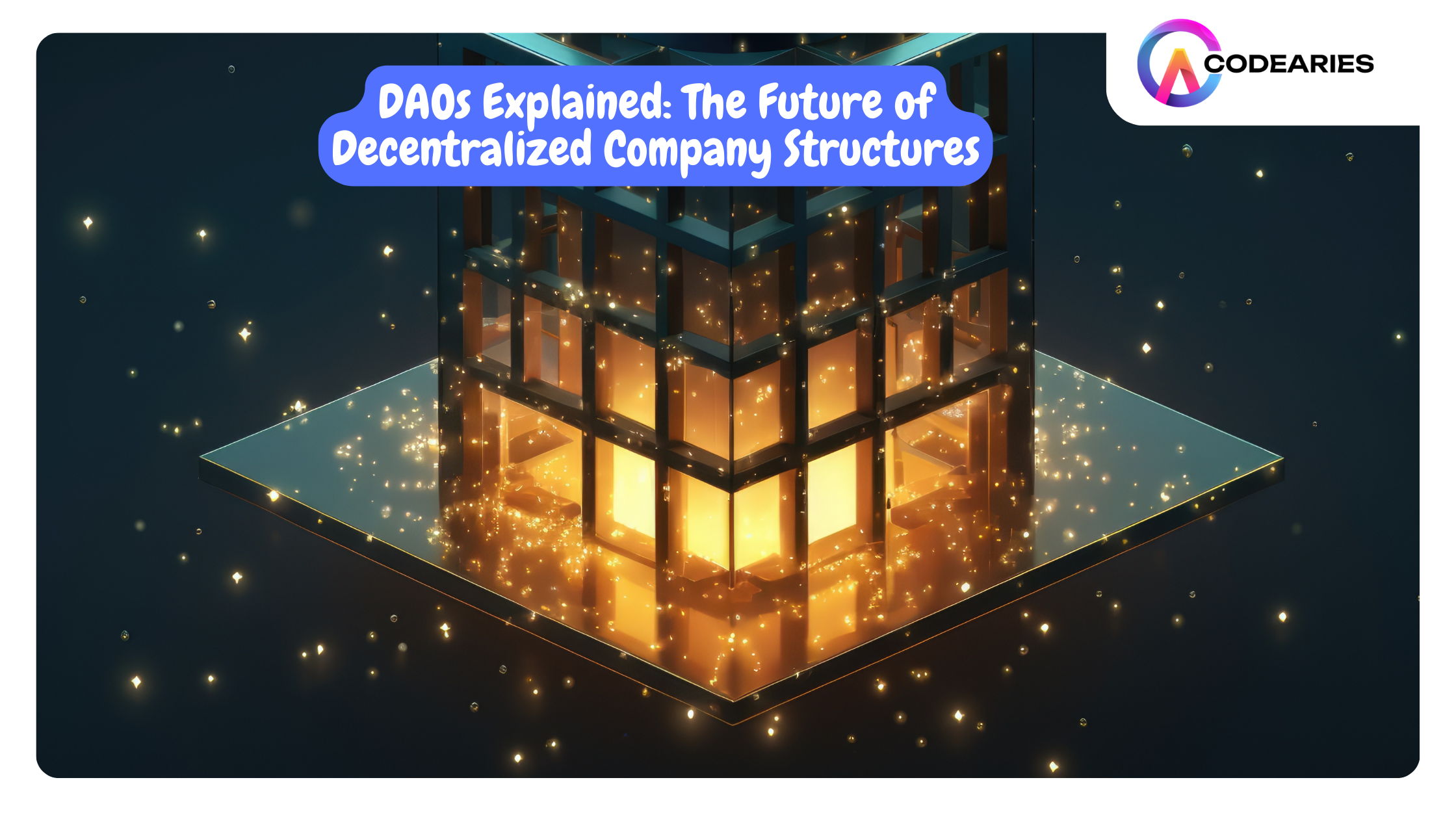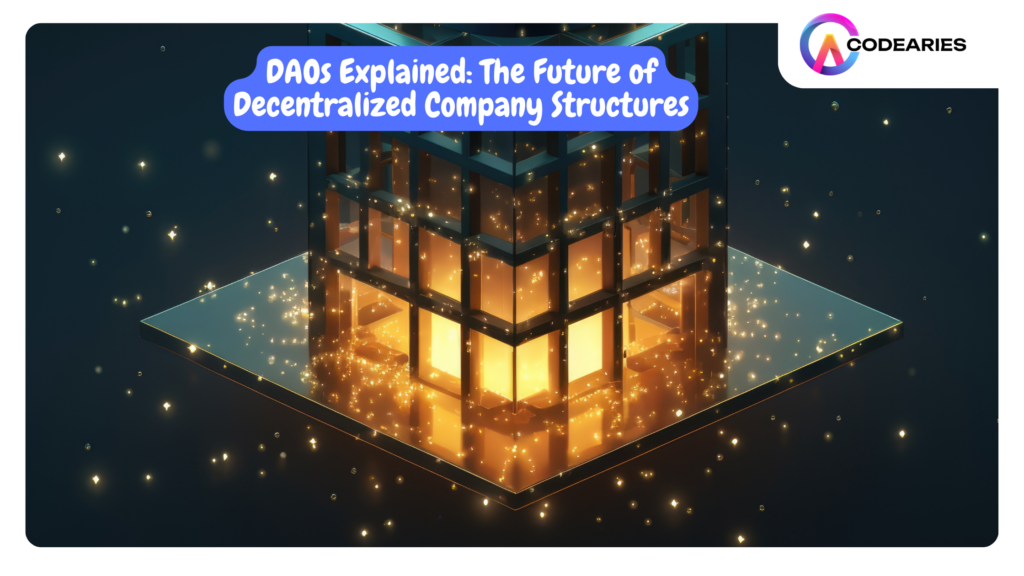
DAOs Explained The Future of Decentralized Company Structures

Introduction
In recent years, a revolutionary concept has emerged in the world of organizational governance: Decentralized Autonomous Organizations (DAOs). These entities operate without centralized leadership, relying on blockchain technology and smart contracts to make decisions and manage operations. DAOs have the potential to transform traditional company structures and governance models, offering more transparent, efficient, and democratic ways to run organizations. This article delves into the concept of DAOs, explains how they function, and explores their potential to revolutionize the corporate world.
What is a DAO?
Basic Definition
A Decentralized Autonomous Organization (DAO) operates based on rules encoded in computer programs known as smart contracts. These smart contracts are stored on a blockchain, which is a decentralized and transparent digital ledger. Unlike traditional organizations that have a hierarchical structure and centralized leadership, DAOs operate through collective decision-making processes facilitated by blockchain technology.
Key Characteristics
- Decentralization: DAOs do not have a central authority. Decisions are made collectively by all the members via consensus mechanism.
- Autonomy: Once deployed, a DAO operates independently according to its predefined rules. Human intervention is minimized.
- Transparency: All transactions and rules are recorded on the blockchain, making them transparent and immutable.
- Democracy: Members of a DAO have voting rights proportional to their stake in the organization. This ensures that all members have a say in the decision-making process.
How DAOs Function
Smart Contracts
Smart contracts are the core of every DAO. These are self-executing agreements with the terms directly coded within them. Smart contracts automatically enforce rules and execute agreed-upon actions when certain conditions are met. For example, a smart contract in a DAO might automatically distribute profits to members based on predefined criteria.
Example: A DAO focused on funding art projects might have a smart contract that automatically releases funds to a project once it receives a certain number of votes from members.
Governance Tokens
DAOs use governance tokens to facilitate decision-making and governance. These tokens represent a member’s voting power in the organization. The more tokens a member holds, the greater their influence in the DAO. Governance tokens are typically distributed to members in exchange for their contributions or investments in the organization.
Example: In a DAO for software development, contributors might receive governance tokens based on the amount of code they contribute or the impact of their work.
Voting Mechanisms
DAOs employ various voting mechanisms to ensure fair and democratic decision-making. Some common methods include:
- Simple Majority: Decisions are made based on a majority vote.
- Quadratic Voting: Members allocate votes based on the intensity of their preferences, reducing the influence of large stakeholders.
- Liquid Democracy: Members can delegate their voting power to others, allowing for flexible and representative decision-making.
Example: A DAO for a music streaming platform might use quadratic voting to decide which new features to develop, ensuring that decisions reflect the preferences of the broader community.
Benefits of DAOs
Transparency and Trust
One of the most significant advantages of DAOs is their transparency. Since all transactions and decisions are recorded on the blockchain, they are publicly accessible and cannot be altered. This transparency builds trust among members and stakeholders, as they can verify actions and outcomes independently.
Example: A charity DAO can demonstrate to donors that their contributions are being used as intended, as all expenditures and donations are transparently recorded on the blockchain.
Efficiency and Cost Savings
DAOs eliminate the need for intermediaries and reduce administrative overhead. Smart contracts automate processes that would typically require manual intervention, streamlining operations and reducing costs.
Example: A DAO-based supply chain management system can automatically track and verify the movement of goods, reducing the need for manual record-keeping and decreasing the likelihood of errors.
Decentralized Decision-Making
DAOs empower their members by giving them a direct say in the organization’s operations. This decentralized decision-making model can lead to more innovative and diverse ideas, as it leverages the collective intelligence of the community.
Example: A DAO for open-source software development allows developers from around the world to propose and vote on new features, fostering a more collaborative and innovative environment.
Challenges and Limitations
Technical Complexity
The implementation and management of DAOs require a high level of technical expertise. Creating secure and reliable smart contracts is crucial, as any vulnerabilities can be exploited.
Example: The infamous “DAO Hack” in 2016, where a vulnerability in the smart contract code of a DAO led to the loss of millions of dollars’ worth of cryptocurrency.
Legal and Regulatory Uncertainty
DAOs operate in a legal grey area, as most jurisdictions do not have clear regulations governing their activities. This uncertainty can pose challenges for compliance and protection of members’ rights.
Example: A DAO operating across multiple countries may face difficulties in complying with varying legal requirements and ensuring legal recognition.
Coordination and Governance
While decentralization offers many benefits, it can also lead to challenges in coordination and governance. Reaching consensus among a large and diverse group of members can be time-consuming and difficult.
Example: A DAO with thousands of members may struggle to achieve timely decisions on critical issues, slowing down its operations.
Potential Applications of DAOs
Decentralized Finance (DeFi)
DAOs are at the forefront of the DeFi movement, providing decentralized financial services such as lending, borrowing, and trading without traditional intermediaries like banks.
Example: MakerDAO, a prominent DeFi platform, allows users to create and manage stablecoins through a decentralized governance model.
Social and Community Organizations
DAOs can be used to create and manage social and community organizations, enabling members to collectively fund and support projects that align with their values.
Example: Friends With Benefits (FWB) is a DAO that operates as a social club, allowing members to collaborate on creative projects and participate in exclusive events.
Supply Chain Management
DAOs can enhance supply chain management by providing transparent and tamper-proof records of the movement of goods, improving accountability and reducing fraud.
Example: A DAO-based supply chain platform can track the origin and movement of food products, ensuring transparency and traceability for consumers.
Intellectual Property and Royalties
DAOs can streamline the management of intellectual property and royalties, ensuring fair distribution of earnings to creators and stakeholders.
Example: A DAO for music royalties can automatically distribute payments to artists, producers, and other rights holders based on predefined rules and contracts.
Case Study: CodeAries and DAOs
CodeAries, a leading provider of IT software development services, is uniquely positioned to develop advanced platforms that leverage the power of DAOs. By combining expertise in blockchain technology, smart contracts, and software development, CodeAries can create innovative solutions that address the needs of various industries.
Potential Solutions by CodeAries
- DAO Development Platforms: CodeAries can develop platforms that enable organizations to create and manage their own DAOs, providing tools for governance, voting, and smart contract management.
- Smart Contract Auditing: CodeAries can offer auditing services to ensure the security and reliability of smart contracts used in DAOs, minimizing the risk of vulnerabilities and exploits.
- Integration with Existing Systems: CodeAries can help organizations integrate DAO functionality with their existing systems, enabling seamless adoption and operation.
Custom DAO Solutions: CodeAries can develop custom DAO solutions tailored to the specific needs of clients, whether they are in finance, supply chain management, intellectual property, or other sectors.
Conclusion
Decentralized Autonomous Organizations (DAOs) represent a paradigm shift in how organizations are structured and governed. By leveraging blockchain technology and smart contracts, DAOs offer a transparent, efficient, and democratic alternative to traditional company structures. While there are challenges to overcome, the potential benefits of DAOs are immense, promising to revolutionize various industries and pave the way for more inclusive and innovative forms of governance.
CodeAries is at the forefront of this technological evolution, ready to develop cutting-edge platforms that leverage the power of DAOs. By addressing the challenges and exploring the vast potential of this technology, CodeAries can play a pivotal role in shaping the future of organizational governance.


